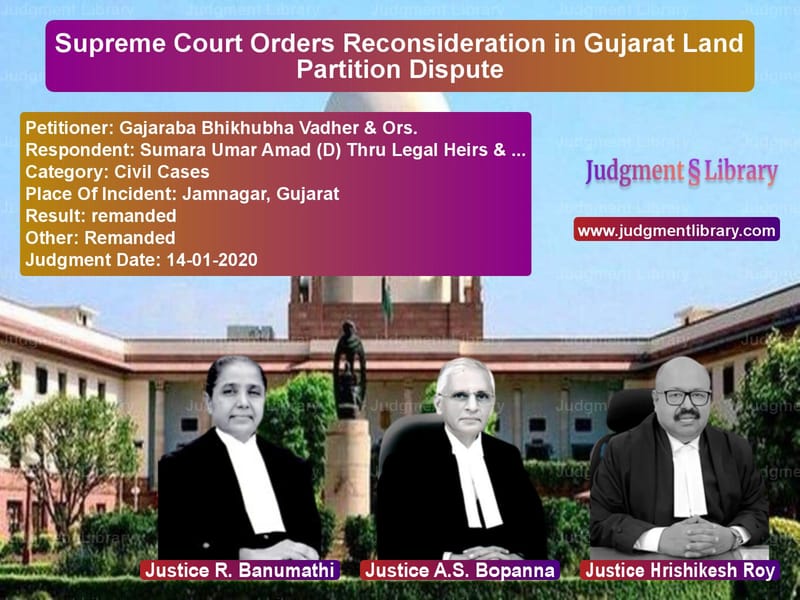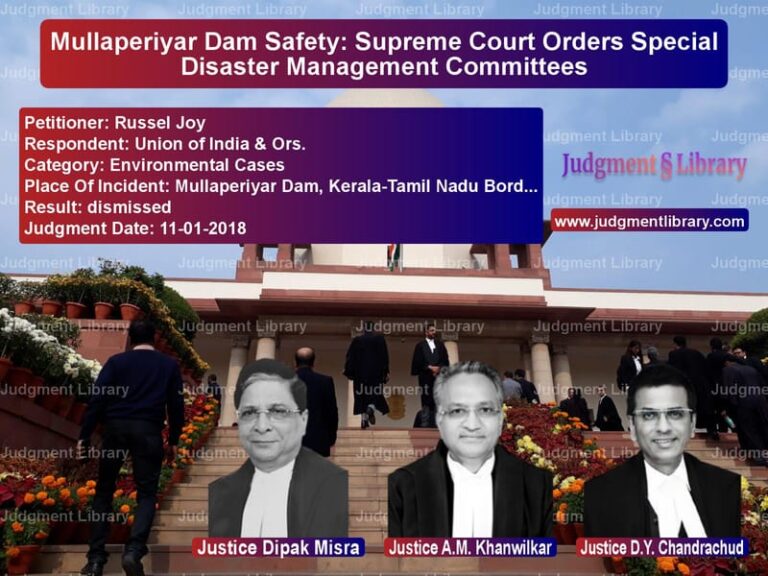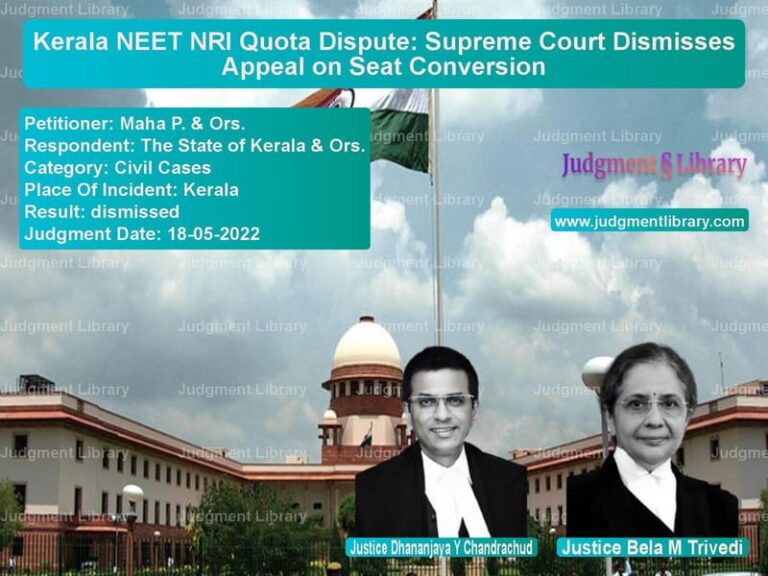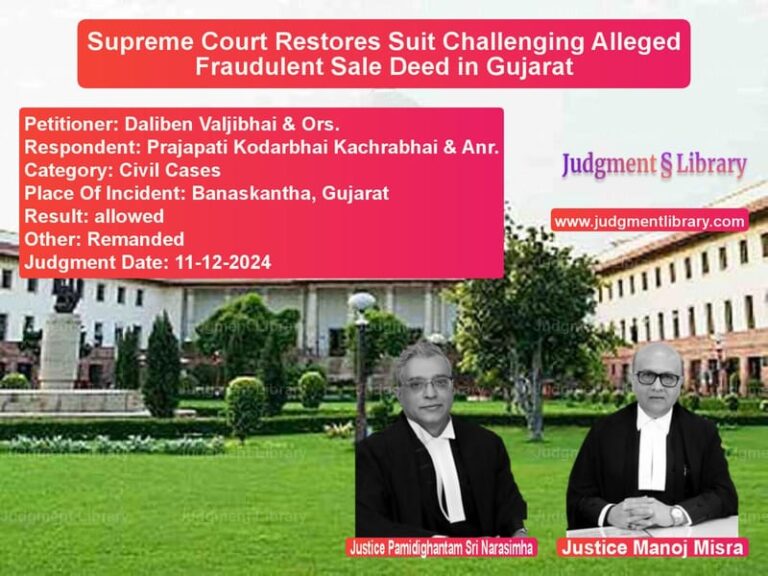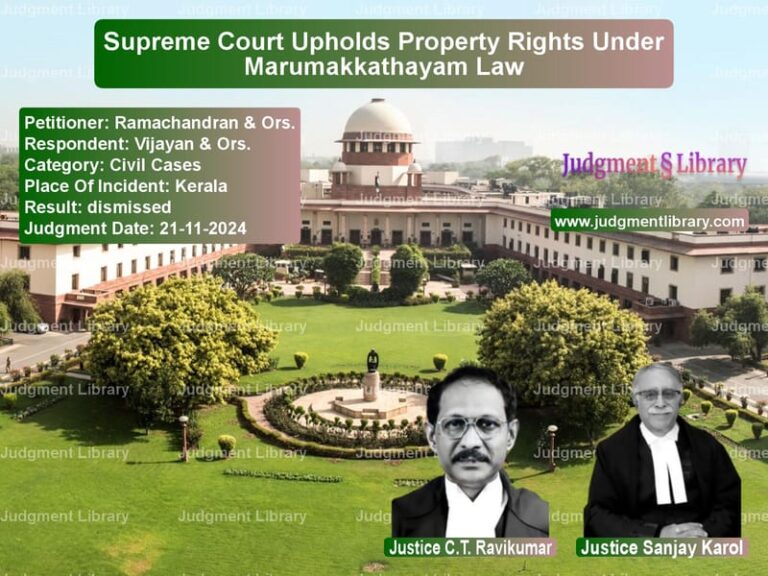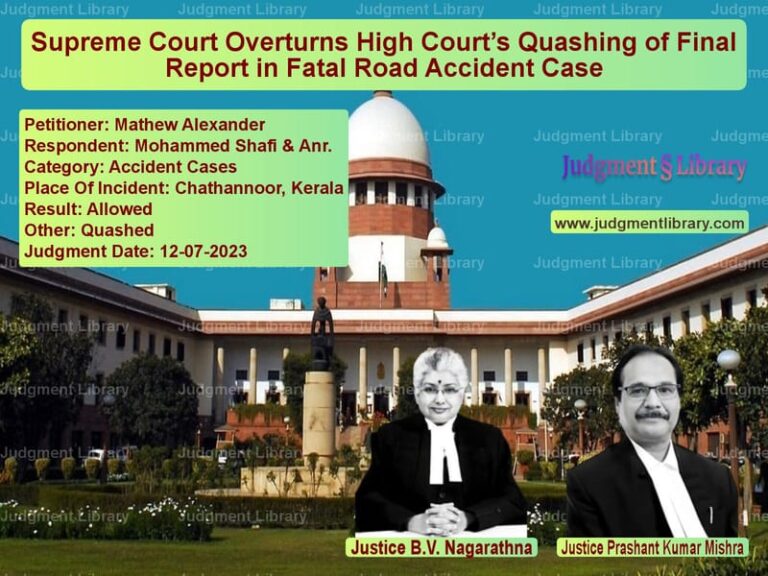Supreme Court Orders Reconsideration in Gujarat Land Partition Dispute
The case of Gajaraba Bhikhubha Vadher & Ors. vs. Sumara Umar Amad (D) Thru Legal Heirs & Ors. involves a complex land partition dispute in Gujarat, centering on whether third-party purchasers of disputed property have the legal standing to challenge an appellate court’s decision in a partition suit. The Supreme Court was tasked with determining whether the Gujarat High Court erred in its ruling and if the matter required reconsideration.
Background of the Case
The dispute dates back to 1974, when Sumara Umar Amad, the original plaintiff, filed a suit for partition of Survey No. 36 in Dhinchna village, Jamnagar. The plaintiff sought a half-share in the property, asserting joint ownership with his father, Sumara Amad Osman. He based his claim on a past mortgage transaction and the overall nature of property possession.
Key developments in the case:
- In 1974, the father, Sumara Amad Osman, published a newspaper notice indicating his intention to sell the property.
- By 1975, a portion of the land had been sold to third-party buyers.
- The father passed away in 1978, prompting the inclusion of his legal heirs as defendants.
Decisions by the Lower Courts
Trial Court (1982)
The Trial Court dismissed the plaintiff’s claim, ruling that under Islamic law, he had no right to seek partition during his father’s lifetime. The court held that the father was the sole owner and had full authority to sell the land.
First Appellate Court (2012)
The plaintiff challenged the Trial Court’s decision in a regular appeal. The First Appellate Court reversed the Trial Court’s ruling and declared that the plaintiff was entitled to a half-share in the disputed land. This decision invalidated prior sales made by the father.
High Court of Gujarat (2016)
The third-party purchasers, who had legally bought portions of the land, filed a second appeal, arguing that their interests were overlooked. However, the Gujarat High Court ruled against them, stating that as third parties, they had no right to challenge the partition decree. The High Court dismissed their appeal without fully addressing key legal questions raised.
Arguments by the Appellants (Third-Party Purchasers)
The third-party purchasers contended that:
- They had legally acquired the land and should be allowed to challenge the appellate court’s partition decision.
- The High Court failed to consider six substantial questions of law framed at the time of admitting the appeal.
- The appellate court and High Court overlooked key confirmation deeds executed in 2011 and 2012, in which the plaintiff had ratified prior sales.
Arguments by the Respondents (Original Plaintiff and Heirs)
The respondents (heirs of Sumara Umar Amad) countered that:
- The land sales were fraudulent and executed while the partition suit was pending.
- The third-party purchasers were bound by lis pendens (doctrine under Section 52 of the Transfer of Property Act).
- The confirmation deeds did not override the judicially recognized partition decree.
Supreme Court’s Observations
The Supreme Court found that the Gujarat High Court had failed to address the six substantial questions of law it had framed at the time of admitting the appeal.
Justice A.S. Bopanna observed:
“When substantial questions of law are framed, they must be addressed and answered with proper reasoning. The High Court’s failure to do so necessitates reconsideration.”
The Court also emphasized that the impact of the confirmation deeds should have been examined. It found that the High Court’s ruling was inadequate as it dismissed the appeal without a thorough evaluation of the legal issues raised.
Final Judgment
The Supreme Court ruled:
- The Gujarat High Court’s decision was set aside.
- The case was remanded to the High Court for fresh consideration.
- The High Court was directed to properly examine all substantial questions of law and analyze the rights of third-party purchasers.
Implications of the Judgment
This ruling has significant legal implications:
- Courts must address all substantial legal questions raised in an appeal.
- Third-party property buyers can challenge partition decrees if they can prove legal standing.
- The principle of lis pendens does not automatically invalidate all property transactions made during a pending suit.
Conclusion
The Supreme Court’s ruling ensures a fair hearing for third-party purchasers and reinforces the duty of courts to resolve all legal issues in appellate proceedings. The case will now return to the Gujarat High Court for fresh adjudication.
Petitioner Name: Gajaraba Bhikhubha Vadher & Ors..Respondent Name: Sumara Umar Amad (D) Thru Legal Heirs & Ors..Judgment By: Justice R. Banumathi, Justice A.S. Bopanna, Justice Hrishikesh Roy.Place Of Incident: Jamnagar, Gujarat.Judgment Date: 14-01-2020.
Don’t miss out on the full details! Download the complete judgment in PDF format below and gain valuable insights instantly!
Download Judgment: Gajaraba Bhikhubha V vs Sumara Umar Amad (D) Supreme Court of India Judgment Dated 14-01-2020.pdf
Direct Downlaod Judgment: Direct downlaod this Judgment
See all petitions in Property Disputes
See all petitions in Succession and Wills
See all petitions in Landlord-Tenant Disputes
See all petitions in Specific Performance
See all petitions in Judgment by R. Banumathi
See all petitions in Judgment by A. S. Bopanna
See all petitions in Judgment by Hrishikesh Roy
See all petitions in Remanded
See all petitions in Remanded
See all petitions in supreme court of India judgments January 2020
See all petitions in 2020 judgments
See all posts in Civil Cases Category
See all allowed petitions in Civil Cases Category
See all Dismissed petitions in Civil Cases Category
See all partially allowed petitions in Civil Cases Category

